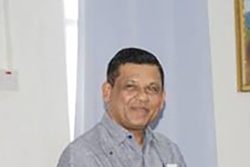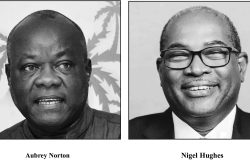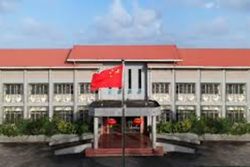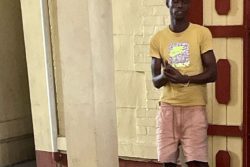No one could believe what they witnessed in the Oval Office on Friday. The Ukrainian Ambassador to the US had her head in her hands, and both the reporters present as well as those outside the office to whom the footage was relayed said that in all their experience of such encounters they had never seen anything like it.
President Volodymyr Zelensky was in the White House to sign a minerals deal with President Trump, but a press briefing was held prior to that being done. It was during reporters’ questions that an exchange which began civilly enough broke down into something approaching a shouting match. This followed an intervention by Vice President J. D. Vance and proceeded with both him and Mr Trump telling their Ukrainian guest he was “disrespectful”.
Mr Vance among other things demanded that he thank the American President for his leadership, as well as saying at one point in relation to the military help America had provided for Ukraine, “Have you said ‘thank you’ once this entire meeting? No.” For his part President Trump told Mr Zelensky, “You’ve done enough talking. You’re not winning this … You gotta be thankful. You don’t have the cards.” He then went on to accuse him of “gambling with World War Three.” President Zelensky held his own – that is when he could be heard.
At the bottom of this confrontation was a disagreement about a security guarantee for Ukraine in the event of a peace deal, and President Trump was not prepared to offer any kind of “backstop”, to use Prime Minister Keir Starmer’s description. For Ukraine, no less than for Europe, it seemed as if Washington was in alliance with the Kremlin. The session ended with no minerals deal, no lunch for the visitor and President Zelensky effectively being evicted from the White House.
The BBC reported that according to one diplomatic observer, the clash was “a planned political mugging,” intended either to force the Ukrainian President to do what America wanted, or cause a crisis which would allow them to blame him for what came next. The options for Kiev at this stage appear bleak, and President Zelensky will join 20 European leaders in London today for discussions. However, what is clear from what has happened (President Macron and Prime Minister Starmer’s efforts notwithstanding), is that Europe and not just Ukraine has been cut adrift. The seventy-five year-old Atlantic alliance is in the process of dissolution.
There are, however, geopoliticians and strategists who suggest that Mr Trump, whatever his behaviour in the Oval Office, has rational international objectives.
To reduce these to their most simplified form: the US regards China as the nation’s most serious threat, and dealing with that threat requires a whole new reset of foreign policy. To begin with America will have to cut its losses in Ukraine and conserve its defence capability in order to be able to inhibit Beijing. Coming to terms with Moscow over Ukraine would be a first tentative step in detaching Russia from the China alliance.
There are various other elements in this theoretical strategy, but in the words of Rebekah Koffler writing in The Telegraph, the idea would be for the US to return to a version of the Monroe Doctrine, refocusing on hemispheric defence. The US would protect North, South and Central America and islands, Russia would dominate Eurasia while Europe would look after itself. Japan, Australia and South Korea with American help would ensure stability in the Indo-Pacific. If this is indeed what is intended, then it has the distinct whiff of 19th century-style spheres of influence.
What can be said is that Washington is taking more interest in South America and the Caribbean than any US President in recent times. Not all of it, it must be said, is entirely welcome. Last month Secretary of State Marco Rubio paused all US foreign assistance funded by the State Department and USAID pending a 90-day review, although subsequently it was announced activities tackling disease and risks of maternal and child mortality were exempted. Where aid cuts through the Bureau of Population, Refugees and Migration were concerned, however, there had been a severe impact on local programmes, and Foreign Minister Hugh Todd told this newspaper government might have to step in to help.
Then there is the matter of those countries, including Guyana, which employ Cuban medical practitioners. The Trinidad Guardian has reported that a meeting between US officials and Caricom Foreign Affairs Ministers is to be arranged this month in relation to the decision to restrict the visas of government officials
and their immediate family members if they derive from such nations. Last week Mr Rubio described the arrangement with Cuba as an “abusive and coercive labour practice, which enriches its regime while depriving Cuban citizens of the medical care they desperately need in their home country.”
Georgetown has been at great pains to humour the White House, as is evident from its votes on Ukraine in the UN Security Council and General Assembly recently. And perhaps it has taken heart with the decision not to renew Chevron’s licence in Venezuela, contrary to what a source told one American newspaper recently was the intention. President Trump said in a post that this was because Mr Maduro had not met “electoral conditions” and had not been transporting Venezuelans back from the US at a pace which had been agreed.
Whether this suggests there is any intention to dislodge President Maduro from Miraflores is not something anyone knows. At an earlier stage Mr Trump had said he was not looking for regime change in Caracas, but it must always be borne in mind that the American President is possessed of a somewhat mercurial temperament.
Whatever the new dispensation at an international level, Guyana remains especially interested in border security. The termination of the Chevron licence will cause the neighbouring country severe economic problems, which might be a motivation for Mr Maduro to turn his greedy eyes in the direction of our gold fields and our oil fields. Yesterday’s outrageous incursion by a Venezuelan coast guard vessel into waters off the Demerara coast and the threat to a Floating Production, Storage and Offloading platform is the starkest evidence of such a possibility. It will also put the attack by gunmen from the Venezuelan side on February 17th – the 59th anniversary of the Geneva Agreement – on Guyana Defence Force soldiers in a different light.
Whether Mr Maduro would assess that should he make a move, Washington would not intervene except at a verbal level, is impossible to say. Following yesterday’s incursion Washington issued a swift warning to the effect that “Further provocation will result in consequences for the Maduro regime. The United States reaffirms its support for Guyana’s territorial integrity and the 1899 arbitral award”. While the White House seems to be pursuing rapprochement with the Kremlin, there would be little tolerance for Russian interference in support of Venezuela.
Then there is all the other absurd nonsense about electing a governor for ‘Guayana Esequiba’ and a criminal enquiry into injuries sustained by sindicatos after they shot and wounded six Guyanese soldiers on February 17th, but the government here can probably feel reasonably confident that as long as President Maduro is in office, Washington will back the Guyana position. Mr Rubio has already declared his support for the legitimacy of Guyana’s current western border and that was restated yesterday.
President Trump has upturned the international order, something which on Friday became obvious to anyone hitherto unconvinced. Guyanese sit here in the hope that even with a reinvigorated version of the Monroe Doctrine, it will not have too major an effect on them.









